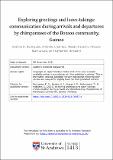Exploring greetings and leave-takings : communication during arrivals and departures by chimpanzees of the Bossou community, Guinea
Abstract
In human fission–fusion societies, ritualized non-linguistic signal exchanges that include gestures, vocalizations, and facial expressions are regularly observed at both arrivals (greetings) and departures (leave-takings). These communicative events play an important role in the formation and maintenance of social relationships. Wild chimpanzees also form large communities that split into smaller fluid parties during daily activities, with individuals moving freely between them. However, in chimpanzees only greetings have been reported. This study explores signal exchanges in the Bossou chimpanzee community during fissions (departures) and fusions (arrivals) given an individual’s social rank, kinship, position as traveller or party-member, the level of potential threat, and the party size and presence of mature males. We analysed three time periods (1993–1994; 2003–2004; 2013–2014) during which the composition and social hierarchy of the community varied. We show that the occurrence and form of communication during fission and fusion events are mediated by social factors, including rank, kinship, and party size and composition. Individuals were more likely to communicate during fusions than during fissions, communication was more likely to be produced towards a higher-ranking individual and to non-kin individuals, but the tendency to communicate in general increased with an increase in social rank. The presence of more individuals, and in particular mature males, decreased the likelihood of communication. Communication during fusions supported patterns reported in previous studies on greetings, and our results support the argument that, if present, leave-takings are not a common feature of chimpanzee social interactions. Current methodological difficulties regarding the function of declarative signals hinder our ability to discriminate potential parting rituals within communication before departures. Given similar methodological difficulties, we also provide a note of caution in the interpretation of all signals produced during fusions as ‘greetings’.
Citation
Rodrigues , E D , Santos , A J , Hayashi , M , Matsuzawa , T & Hobaiter , C 2021 , ' Exploring greetings and leave-takings : communication during arrivals and departures by chimpanzees of the Bossou community, Guinea ' , Primates , vol. First Online . https://doi.org/10.1007/s10329-021-00957-z
Publication
Primates
Status
Peer reviewed
ISSN
1610-7365Type
Journal article
Description
The research was supported by a grant from the Portuguese national funding agency for science, research and technology (SFRH/BD/138406/2018) and by the Claudia Sousa Memorial Fund to the first author. M.H. is funded by MEXT/JSPS Grant-in-Aid for Scientific Research on Innovative Areas #4903 (Evolinguistics) JP17H06381. T.M. is funded by MEXT-JSPS #24000001 and #16H06283) as well as the Japan Society for the Promotion of Science (JSPS) Core-to-Core Program CCSN and the Leading Graduate Program U04-PWS. C.H. is funded by the European Union’s 8th Framework Programme, Horizon 2020, under grant agreement no 802719.Collections
Items in the St Andrews Research Repository are protected by copyright, with all rights reserved, unless otherwise indicated.

